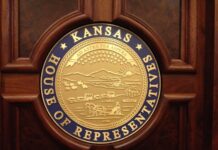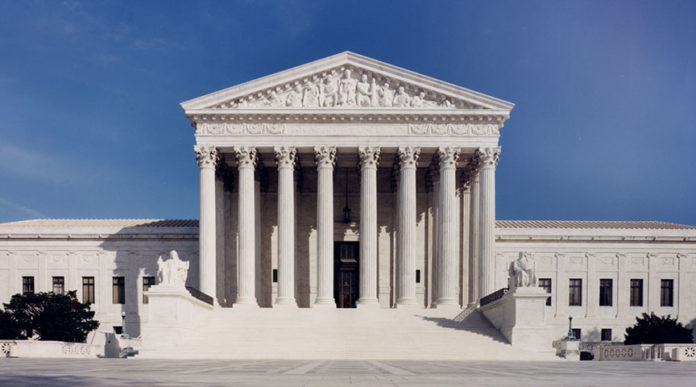(Updated to include comments from Kobach, ACLU, and the attorney general)
The U.S. Supreme Court on Monday turned away Kansas’ request to uphold a controversial state law that requires proof of citizenship when registering to vote.
The high court refused to hear the case and let stand lower-court rulings that found the law was unconstitutional because it imposed an obstacle to voting.
The law had already been rejected once by the U.S. 10th Circuit Court of Appeals and earlier by U.S. District Judge Julie Robinson in what has been described as the most important voting rights trial this century.
“Kansas voters can breathe a sigh of relief,” said Lauren Bonds, legal director of the American Civil Liberties Union of Kansas.
“After years of litigation, we finally have a binding court decision blocking Kansas’s suppressive documentary proof of citizenship requirement.”
The court’s decision effectively ends a legal battle that has spanned at least four years and was a central theme for former Kansas Secretary of State Kris Kobach, who became a national political figure in his battle against unsubstantiated claims of voter fraud.
Kobach, the architect of the law passed by the Legislature in 2011, had argued for the law, claiming rampant voter fraud.
However, the lower courts dismissed that claim because of a lack of evidence to document widespread voter fraud.
With only 39 confirmed cases of a noncitizens registering in Kansas from 1999 to 2013 before the citizenship requirement started, District Judge Robinson could not find “empirical evidence that a substantial number of noncitizens” successfully registered to vote.
She pointed out that the 39 cases made up only 0.002% of all Kansas registered voters as of Jan. 1, 2013.
Evidence at trial, meanwhile, revealed that almost 12% of all voter registration applications, or 30,732, submitted since the law started in 2013 were invalidated because of the citizenship requirement. They were either canceled or placed on a suspended list.
Attorney General Derek Schmidt questioned whether the citizenship requirement was so burdensome that Kansans couldn’t vote because they couldn’t obtain the necessary documents.
He argued there was no evidence showing that the Kansans who were placed on the canceled or suspended list could not document their citizenship with a birth certificate, a passport or any of the required documents.
“Respondents repeatedly point to the roughly 30,000 applicants who were not registered in Kansas, but they cannot and do not dispute that there is no evidence as to how many of these individuals did not possess or could not obtain proof of citizenship,” Schmidt wrote.
“The fact that these individuals did not provide proof of citizenship does not demonstrate that it would have been a burden — much less an unconstitutionally severe
burden — for them to do so.”
Schmidt argued that the proof-of-citizenship requirement for registering to vote was less burdensome than an Indiana voter identification law upheld by the U.S. Supreme Court.
Schmidt claimed that the burdens imposed on prospective voters under the Indiana and Kansas laws were similar.
The Indiana law required a photo ID to vote, while the Kansas law requires proof of citizenship to register, he said.
The attorney general pointed out that prospective voters in Indiana had to present a birth certificate, passport or some other document to obtain the free photo identification the state provided.
In a statement, Schmidt said he appealed the case to the U.S. Supreme Court because it passed with overwhelming majorities in the Legislature in 2011. The bill passed 111-11 in the House and 36-3 in the Senate.
“With today’s decision no options for further legal defense remain and the legislature will need to determine how to proceed in light of the judicial rulings,” Schmidt spokesman John Milburn said in a statement.
The American Civil Liberties Union had urged the court not to review the Kansas law requiring proof of citizenship when registering to vote.
In a brief filed with the court, civil liberties lawyers argued the case was limited in scope and did not merit the high court’s attention.
In its briefing, the ACLU said that while three states have laws similar to Kansas, two are inoperative and one “is substantially less onerous.”
Arizona was the only other state that requires more than a declaration to establish citizenship for voter registration, the ACLU said.
But Arizona’s law could be satisfied by simply writing down a driver’s license number, or by showing a citizenship document.
“This case concerns only an idiosyncratic requirement in a single state: Kansas’s particular
method for requiring first-time registrants to prove they are citizens — by presenting a document establishing U.S. citizenship,” they argued.
“Kansas is the only state in the union requiring those seeking to register to present a citizenship document, as opposed to signing an attestation or writing down a driver’s license number,” the brief stated.
“This outlier registration requirement — the most onerous in the nation — caused a ‘mass denial of a fundamental constitutional right.’”
ACLU lawyers said the case did not warrant a review, partly because there was no split between judicial circuits and no other state has a similar law in place.
“A ruling in this case would therefore be of little relevance to other states,” the argued.
In an interview, Kobach agreed that a lack of a split between judicial circuits hurt the case’s chance of being heard by the Supreme Court.
“We knew that would potentially be an issue if it had to go to the Supreme Court,” Kobach said. “That is one of their key requirements.”
Kobach said the ACLU benefited from a judges who presided over the case, especially at the 10th Circuit.
“With a different panel of judges or if this case had gone to the Supreme Court, the result would have been 180 degrees different,” he said.
“For the ACLU to claim some sort of vindication is laughable,” he said. “They’re doing a victory lap because they got lucky.”
Schmidt argued the Kansas law had national implications, pointing out that three other states had laws requiring documentary proof of citizenship for voter registration.
Further, Schmidt argued the case is about the states’ right to decide what laws are necessary to decide who’s qualified to vote.
“Even if Kansas’s law were unique, this case would still raise important issues,” Schmidt’s brief states.
“A basic premise of our system of federalism is that states may make different choices as to what laws are appropriate,” he argues.
He contended the Voter Qualifications Clause in the Constitution “was to leave decisions about voter qualifications to the states rather than to impose a single national standard.”
He added, “The rules for verifying voter qualifications for even a single state could have a
national effect, particularly when it comes to the Electoral College outcome or control of Congress.”
Eighteen states, including neighboring Missouri, Nebraska and Oklahoma, asked the U.S. Supreme Court to hear the case.
The states argued that they “have important and compelling interests in deterring and detecting voter fraud, as well as safeguarding voter confidence and promoting the integrity of elections.”
They further contend that the Tenth Circuit’s reasoning would allow courts to undercut their judgment over how to best to verify and enforce voter qualifications.
They said the 10th Circuit used a “flexible” and “sliding scale” test that tries to balance a law’s burdens against the state’s interests — a test stemming from a U.S. Supreme Court decision that upheld Indiana’s voter ID law.
“Using a freestanding balancing test has not brought stability or predictability to election-law jurisprudence,” the states argue.
“Two courts can look at the same law and reach opposite conclusions. Plaintiffs can argue that commonplace laws are too burdensome.
“Election laws can stand or fall based on where an individual judge decides to place a burden on the sliding scale. As a result, states are left without any certainty about which election laws will be permissible.”
.













